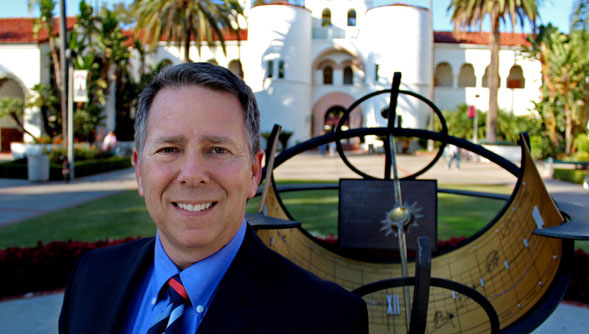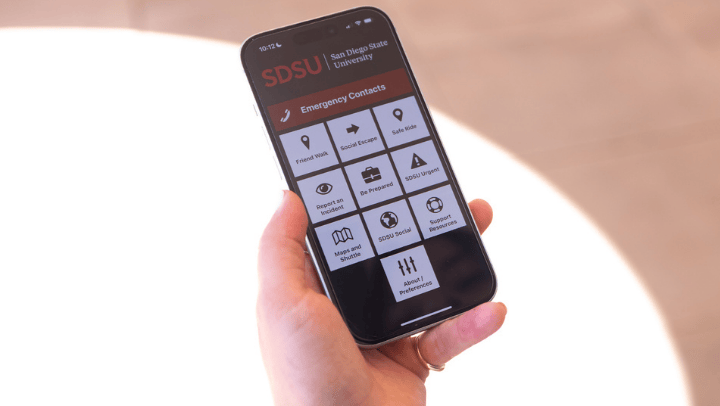7 Things About Brian Spitzberg
Communications professor Brian Spitzberg shares his favorite things about being a part of SDSU's faculty and advice for current students.

Brian Spitzberg, a communications professor at San Diego State University, obtained both his bachelor's and master's degrees ('78, '80) at the University of Texas at Arlington, and earned his Ph.D. in communication arts and sciences at the University of Southern California in 1981. He has taught at San Diego State University since 1989.
In 2010, he was recognized as the Senate Distinguished Professor for his excellence in teaching. His areas of research include interpersonal communication skills, conflict, jealousy, infidelity, intimate violence, sexual coercion and stalking.
Spitzberg teaches both undergraduate and graduate courses in the areas of methodology, theory, conflict management, relational communication and the dark side of communication.
1. What inspired you to do this kind of work?
I didn’t know what I wanted to do until I reached grad school, although I figured it would be academically oriented. The most important factors propelling me in the course I eventually took were: (1) loving parents who stuck it out through thick and thin, (2) not being able to sing (a longer story), (3) becoming active in intercollegiate competitive forensics/debate, (4) having a faculty mentor recommend me to graduate study, (5) having faculty in the graduate program who envisioned me as an eventual legacy, and (6) forming a deep and trusting friendship with a compatible fellow graduate student, with whom I have now coauthored or co-edited about 40 papers, articles, chapters and books.
2. How long have you worked at SDSU?
I was a visiting associate professor in the spring of 1988, but I became a tenure track faculty member in the fall of 1989.
3. What is the best piece of advice you ever received?
Buy low, sell high? Don’t pick your nose in public? Probably one of my graduate professors, who said, “You can’t know what needs to be done until you know what has been done.”
When queried about the dilemma this creates, since there is always more to know and deadlines often await, he clarified, “Sometimes, you just have to put everything down and start writing.”
4. What is your favorite thing about your job?
What’s not to like? I get to come to a place every day where a library is the geospatial center of campus. I get to wear what I want to wear. I have my own office (with a window). I get to study what I want to study. I get to spend much of my daily life engaged in a process of creation where overheard conversations are just as likely to be discussing Karl Marx as they are Groucho Marx. The job represents a profession where I have many criteria by which to evaluate my sense of achievement and where I can excel through legitimate effort and ability. There is never a day in which curiosity lies idle and is neither piqued nor partially satisfied. The profession has an increasingly rare perk — it comes with tenure, such that regardless of the disrespect that society increasingly shows for higher education in general, I have the psychological security of knowing I have a job tomorrow. Finally, every now and then, I see that I have a significant positive impact on a student, and such legacies are invaluable reminders of how ephemeral life can be if we leave nothing but our own desires to guide us.
5. What about your field or position do you think would surprise people the most?
That on paper we are only required to be somewhere doing something about 10 hours a week, but that the vast majority of us spend something closer to 60 hours a week working on our job. Unlike most jobs, there is never a waking minute of any day in which there are not things we should be doing to improve our competence — updating our knowledge of ever-evolving pedagogical technologies and techniques, grading papers, updating our syllabi, updating our mastery of the research literature in our areas of instruction, writing a manuscript review, writing a manuscript and so forth.
6. What is the most interesting or surprising thing about you?
That I'm an agnostic neopantheist existentialist with leanings toward nihilism, but Jewish by cultural identification? That I study the dark side of human relationships but I'm a pretty happy guy? That I cry easily when I see animals being abused or hurt? That I have a reputation for being hard but my grade distributions don't evidence that I am? That I enjoy watching "Family Guy" and "American Dad" as well as "Dexter"? Hard to say, really.
7. If you could only rescue one thing from your burning office, what would it be?
After my most recently saved thumb drive? Probably my John Cleese “Life of Brian” script autographed to me.
Bonus:
What is your favorite kind of music/what are your favorite bands?
I mostly listen to “Alt” and “singer/songwriter” (especially female vocalists) genres, but it’s easier to describe the genres I don’t like than the ones I do. I’m not fond of rap or country. Most recently I’ve been enjoying ZZ Ward.
What is your favorite sports team or who is your favorite individual athlete?
I grew up in Dallas during the great eras of Landry/Staubach, and Johnson’s superbowl teams, so I am still a Cowboys fan.



